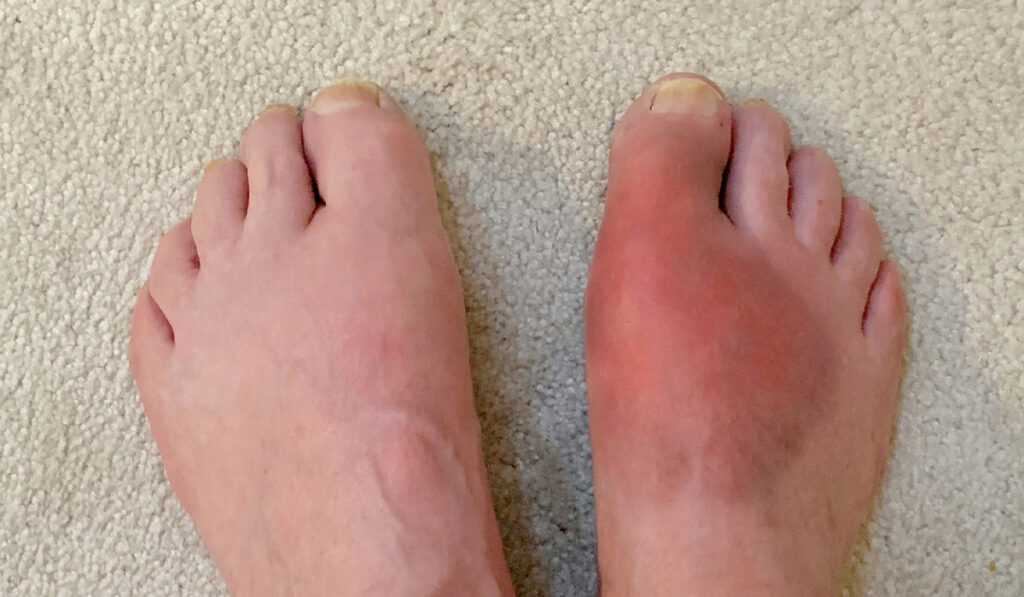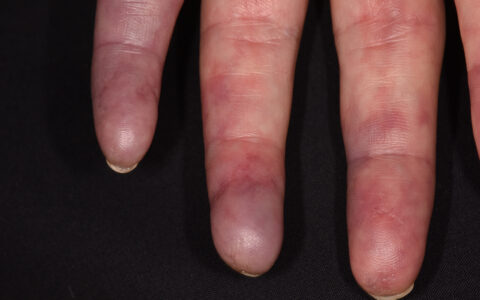For many gout patients with refractory disease following first-line treatment, pegloticase offers welcome symptom relief.
Pegloticase, an immunogenic uricase, also may trigger intolerance and infusion reactions in patients as they develop antibodies, affecting the treatment’s effectiveness. The addition of low-dose methotrexate mitigates these risks, but with side effects that can range from nuisance level to intolerable.
“Leflunomide is effective in tempering drug side effects in a variety of rheumatologic conditions.”
At Vanderbilt University Medical Center, rheumatologist Adenrele Olajide, M.D., is embarking on a study to examine leflunomide, a pyrimidine synthesis inhibitor, as a potential alternative to methotrexate.
“Leflunomide is effective in tempering drug side effects in a variety of rheumatologic conditions,” Olajide said. “Just as methotrexate is frequently repurposed to treat a number of conditions beyond cancer, it is worth formally investigating whether leflunomide can be repurposed for gout therapy.”
Underappreciated Suffering
Gout is associated with chronic conditions such as diabetes, congestive heart failure, kidney disease and metabolic syndrome, as well as behavioral factors, such as regular alcohol use or a diet high in purines. Yet a genetic predilection is the strongest association with the hyperuricemia that characterizes gout.
Many people with hyperuricemia never develop gout, but in others, uric acid crystals (tophi) build up and settle into and around joints. Onset is often sudden, with fiery pain, swelling and redness that can be disabling. Sometimes the crystals are deposited in the skin and kidneys, as well.
“Roughly half of patients with gout are not receiving any treatment or are getting inadequate treatment.”
Olajide sees patients who have had untreated gout that has developed into severe arthritis and joint deformity, kidney damage, kidney stones or heart disease.
“Gout is a condition that has been underappreciated. It is actually the most common type of inflammatory arthritis,” Olajide said. “Yet, roughly half of patients with gout are not receiving any treatment or are getting inadequate treatment.”
Where Therapies Fall Short
Beyond acute symptom management, first-line therapies for gout reduce the production of uric acid through use of xanthine oxidase inhibitors or to increase the output of uric acid in the urine using uricosurics.
Because of its immunogenicity, pegloticase is a second-line therapy used when first-line therapies fail to work adequately, and in patients who have an extremely high levels of uric acid excretion.
A 2021 multicenter trial showed that the immunomodulator methotrexate lowers pegloticase-related side effects while preserving lowered serum uric acid levels.
While Olajide says this news was exciting, the inhibition of dihydrofolate reductase to lower the endothelial function/inflammatory response, has its own side effects, like diarrhea, mouth sores and fatigue. Only some patients find relief through folate treatment.
Leflunomide’s Potential
Olajide expects to find leflunomide become an alternative to methotrexate in patients with other rheumatologic conditions.
“In my practice, few of these patients have failed to find durable symptom relief from leflunomide as an immunogenetic adjunct to their other therapies, so it stands to reason that it may well help with gout.”
Olajide and colleagues plan to follow the template created through the methotrexate trials. All patients in Olajide’s upcoming trial will be treated with pegloticase, a control group will receive a placebo, and the study group will receive adjunctive leflunomide.
The goal is to determine whether pegloticase alone or the combination is most effective for sustained treatment.
“If efficacy is not compromised, we will look at side effects, as well,” Olajide said. “If these are equal or lower, we will hopefully have found a sound alternative we can use to keep patients healthier long-term.”





